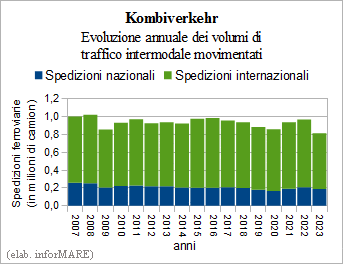
In 2023, Germany's Kombiverkehr, like other leading operators
operating in the European market, has recorded a marked
decrease in the volumes of shipments handled by rail, which are
results of 815 thousand road shipments, with a decrease in
-15.9% on the previous year, of which 629 thousand shipments
international (-17.5%) and 187 thousand national (-10.1%). In terms of
20' containers handled, in 2023 shipments are
amounted to 1.63 million TEUs (-16.0%), shipments that
transported a total of 19 million tonnes compared to 22.9 million tonnes
million tonnes in 2022.
 Kombiverkehr has announced that in 2023 the situation is
was very difficult due to the weakening of the economy
strikes in France and Germany, pressure on the
costs and the decline in quality due to network work
as well as the effects of weather events
on Alpine transport and for the temporary closure of the base tunnel
of the Gotthard. "In some segments," he specified, "
CEO Armin Riedl - these negative factors
are even intensified and, together with the high pressure on the
costs caused by the diversion of services and disproportionate costs
energy for rail transport, have led to a
overall situation which is serious. Unfortunately - he warned
Riedl - this situation will continue until the end
of the year'.
Kombiverkehr has announced that in 2023 the situation is
was very difficult due to the weakening of the economy
strikes in France and Germany, pressure on the
costs and the decline in quality due to network work
as well as the effects of weather events
on Alpine transport and for the temporary closure of the base tunnel
of the Gotthard. "In some segments," he specified, "
CEO Armin Riedl - these negative factors
are even intensified and, together with the high pressure on the
costs caused by the diversion of services and disproportionate costs
energy for rail transport, have led to a
overall situation which is serious. Unfortunately - he warned
Riedl - this situation will continue until the end
of the year'.
Mr Kombiverkehr stated that, as a result of the worsening of the
situation, already at the beginning of 2023 the company has been
forced to adjust transport prices and impose a
additional energy supplements, which at the same time had an impact on the
competitiveness and has caused a
Further widening of road transport price gaps
and rail transport.
Among the negative factors identified, the company believes
In addition, the German transport incentive programme
suffers from a lack of planning and highlighted that
the current state of the federal budget, which provides for a
reduction of funding also for the transport of goods on
rail, makes the use of train paths more efficient again.
costly for operators and freight forwarders. 'I
funding that really aims to significantly increase the
in the future, the market share of the railways in terms of CO2 - has
Co-CEO Heiko Krebs - are therefore
almost outdated. This, for us operators, does not
facilitate a short- and medium-term breakthrough in development
of the activity, all the more so as this year there will be
Important renovation works have also been carried out on primary lines
in Germany, which will also have a significant impact on the
price-performance ratio of combined transport'.
If these factors do not allow Kombiverkehr to predict a
improvement in the short and medium term, a dim light arrives
by Brussels and, in particular, by the adoption last July of the
"Greening Freight Package" completed on
last November by the European Commission's proposal on the
combined transport to achieve the objectives of the Green Deal
European. "Generally speaking," Riedl explained, "we are
very much in favour of the new directives, because finally
shed light on some important issues that the sector needs to
and that have long been ignored. Let's also see
the opportunity to create a level playing field in which
each mode of transport can benefit from its own
specific advantages in a functioning market. In the
At the same time, however, we see the enormous risk that the
can be blocked halfway and thus cement the
imbalance between road and rail. And this - Riedl denounced - is
This is precisely what is likely to happen, not least because the
The Commission only introduced the new rules at the final stage
of the legislature'.